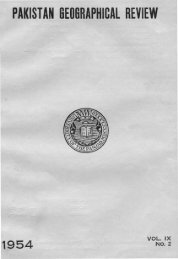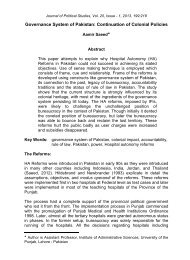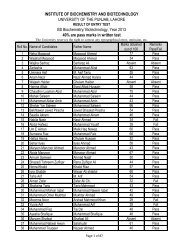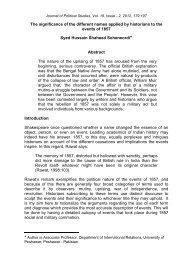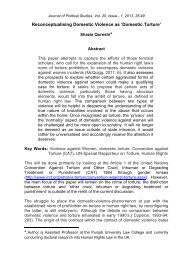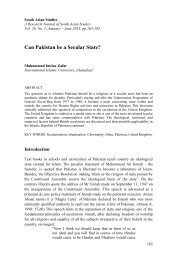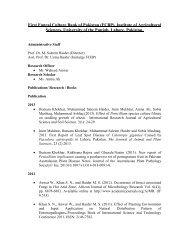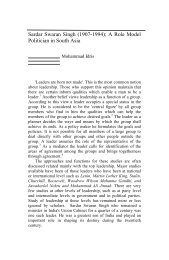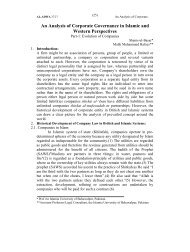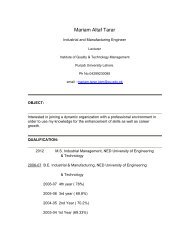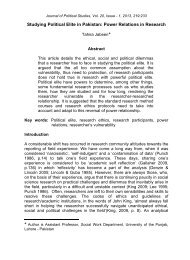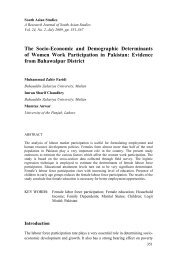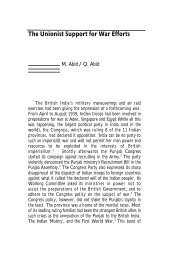Roots of authoritarianism in Pakistan-KU.pdf
Roots of authoritarianism in Pakistan-KU.pdf
Roots of authoritarianism in Pakistan-KU.pdf
Create successful ePaper yourself
Turn your PDF publications into a flip-book with our unique Google optimized e-Paper software.
Journal <strong>of</strong> Political Studies<br />
“In the Indian Subcont<strong>in</strong>ent, the whole concept <strong>of</strong> the power <strong>of</strong><br />
the monarch differed from that <strong>of</strong> European feudalism, <strong>in</strong> which<br />
the k<strong>in</strong>g had authority over all persons and th<strong>in</strong>gs <strong>in</strong> his doma<strong>in</strong>.<br />
This authority was delegated to the lords and the barons who<br />
vowed allegiance to him. Thus, the hierarchy <strong>of</strong> authority was<br />
built up. Both the lands and the people connected with it<br />
belonged to the feudal lord and through him to the k<strong>in</strong>g. This was<br />
a development <strong>of</strong> the Roman concept <strong>of</strong> the dom<strong>in</strong>ion. In India,<br />
the k<strong>in</strong>g had the right to collect certa<strong>in</strong> taxes from the land, and<br />
this revenue collect<strong>in</strong>g power was delegated to others. With<br />
disastrous results, the British broke up the traditional village<br />
communes known as Panchayats and <strong>in</strong>troduced oppressive<br />
feudalism.” 2 Feudalism <strong>in</strong> itself is a form <strong>of</strong> <strong>authoritarianism</strong>. “In<br />
delimit<strong>in</strong>g a formal sphere <strong>of</strong> politics, the British colonial system<br />
aimed at reconsolidat<strong>in</strong>g its authority and plac<strong>in</strong>g the networks <strong>of</strong><br />
social collaboration and control on a firmer foot<strong>in</strong>g.” 3<br />
Both <strong>Pakistan</strong> and India <strong>in</strong>herited the colonial legacy <strong>of</strong><br />
<strong>authoritarianism</strong>. It was quite evident <strong>in</strong> the political system <strong>of</strong><br />
both newborn countries. Immediately after <strong>in</strong>dependence <strong>in</strong><br />
India, “the rule <strong>of</strong> law was ever bent to subserve either executive<br />
action <strong>in</strong> the adm<strong>in</strong>istration or the will <strong>of</strong> dom<strong>in</strong>ant elements <strong>of</strong><br />
society.” 4 Whereas India made an effort to democratise itself –<br />
and has been quite successful – <strong>Pakistan</strong> failed to make a viable<br />
transition to democratic rule after emerg<strong>in</strong>g from the debris <strong>of</strong><br />
British colonialism. The colonial state was quickly replaced by<br />
authoritarian rulers, whether civilian or military. This was<br />
2 Khan, Lal, Crisis <strong>in</strong> the Indian Subcont<strong>in</strong>ent: Partition – Can it be<br />
undone?, (Wellred Publications), p. 18.<br />
3 Jalal, Ayesha, Self and Sovereignty: Individual and Community <strong>in</strong><br />
South Asian Islam s<strong>in</strong>ce 1850, (Lahore: Sang-e-Meel Publication), p.<br />
37.<br />
4 Misra, B.B, Government and Bureaucracy <strong>in</strong> India, 1947-1976, (New<br />
Delhi: Oxford University Press), p. 90.<br />
2



